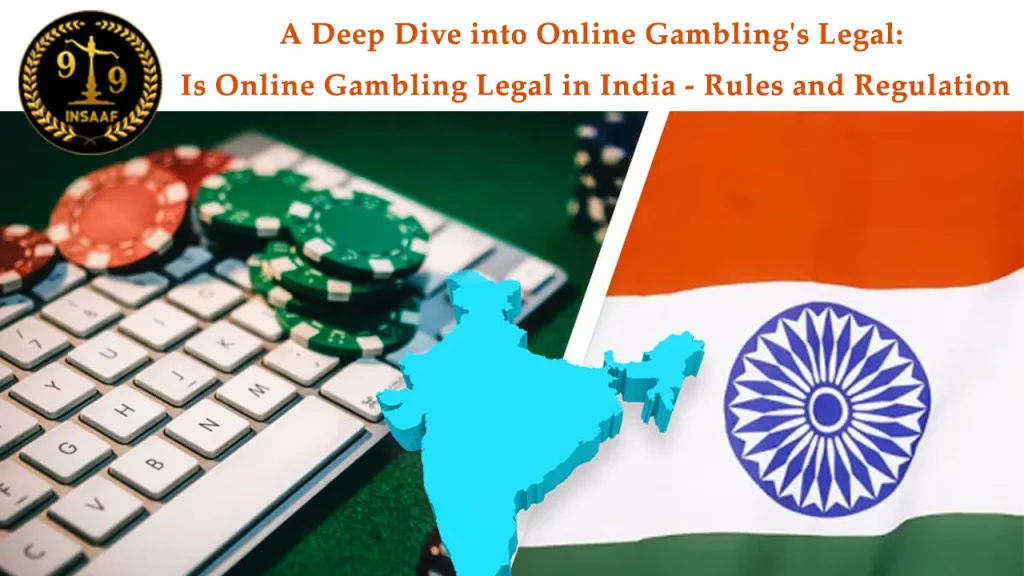

Online Legal Advice from Insaaf99® Online Lawyer Consultation in India


Online Legal Advice from Insaaf99® Online Lawyer Consultation in India

India's online gambling landscape glows like a casino marquee in the desert night, luring players with promises of fortune and the thrilling unknown. However, unlike the certainty of a physical casino, navigating this digital realm is akin to navigating a labyrinth shrouded in legal ambiguity. Is it an unregulated Wild West of jackpots, or a land bound by archaic laws? The answer, much like a winning hand in poker, depends on your standpoint.
In this article we will try to unravel the legal complexity of online gambling in India, deciphering state-by-state regulations, skill-versus-chance distinctions, and the ever-shifting government stance. Whether you're a seasoned player or a curious onlooker, get ready for a journey through ambiguity, where fortunes fluctuate, and the line between legality and chance is as thin as a slot machine's payout line.
The legal landscape of online gambling in India is very complex, with each state performing its unique steps, applying different regulations and restrictions. From the welcoming embrace of digital casinos to the strict bans that firmly shut doors, and the nuanced approaches that linger in the grey areas, the diversified approach related to the legal status of online gambling add complexities.
(A) Licensing under the Goa, Daman, and Diu Public Gambling Act, 1976.
(B) Thriving land-based and online casinos contributing to the local economy.
(C) A magnet for tourism, drawing visitors seeking entertainment and gaming.
(A) Sikkim Online Gaming (Regulation) Act, 2008, paving the way for legitimacy.
(B) Licensing provisions for poker, roulette, and blackjack operators.
(C) Recognition of online gambling as a viable source of state revenue.
(A) Under the Andhra Pradesh Gaming Act, 1974, a categorical prohibition of online gambling.
(B) Stringent penalties and punitive measures for individuals participating in online wagering.
(C) Government focuses on mitigating potential societal issues linked to gambling.
Enforcement of robust measures against online gambling via the Telangana Gaming (Amendment) Act, 2017.
Imposition of fines and imprisonment as consequences for involvement in online gambling activities.
Government-led initiatives aimed at reducing the societal impact associated with gambling.

Lack of explicit provisions for online gambling under the Maharashtra Prevention of Gambling Act, 1887.
Ongoing debates and discussions on the need for potential regulations.
Legal ambiguity leading to uncertainty for both operators and players.
Limited provisions addressing online gambling within the Karnataka Police Act, 1963.
State's exploration of potential regulatory frameworks to adapt to emerging challenges.
The ongoing balancing act between addressing concerns and allowing for entertainment.
Access to a broader range of games and potentially attractive bonuses.
Convenience for Indian players to participate in international gaming.
Drawn by the appeal of a global gaming experience beyond domestic offerings.
Legal risks associated with participating in offshore gambling.
Lack of consumer protection and recourse in case of disputes.
The importance of understanding the jurisdiction and regulations of foreign operators.
In the dynamic world of online gambling, the distinction between games of skill and chance shapes regulatory frameworks. Games like roulette and slots, heavily influenced by luck, face stringent regulations, while poker, acknowledged as skill-based, enjoys legal recognition in certain jurisdictions. The gray area represented by fantasy sports further complicates the dichotomy with its blend of strategy and chance. Legal battles and legislative initiatives seek to define a coherent framework for diverse gaming activities.
The Law's Frown: Games of Chance like Roulette and Slots
(A) Roulette's luck-based nature and its classification as a chance game.
(B) Unpredictable slots and corresponding legal restrictions.
The Skillful Refuge: Poker's Strategic Advantage
(A) Analyzing poker as a skill-based game with strategic decision-making.
(B) Instances of legal acknowledgment of poker's skillful elements.
The Gray Zone: Fantasy Sports and the Blurred Lines
(A) Examining the hybrid nature of fantasy sports, blending skill and chance.
(B) Varied state perspectives and evolving regulations on fantasy sports.
Legal Battles & Legislative Struggles: Finding the Right Fit
(A) Judicial interpretations shaping the skill-chance balance.
(B) Legislative efforts seeking a uniform definition for skill-based games.
(C) The ongoing struggle to balance diverse gaming activities within the legal framework.
The evolving distinction between skill and chance in online gambling underscores the complex legal landscape of online gambling.
The legality of online gambling in India resembles the unpredictability of a high-stakes hand it hinges on both your geographical location and the specific game in play. While certain states have embraced the concept of the digital casino, others firmly close the door. The allure of offshore operators provides a tempting yet potentially precarious alternative. Moreover, the legal landscape is in a perpetual state of flux, with the imminent possibility of new regulations and court rulings reshaping the entire gaming scenario. The dynamism of India's legal stance on online gambling underscores the need for individuals to stay informed about the evolving regulatory landscape, as it continues to influence the parameters of this complex and ever-changing game.
Insaaf99, a leading online legal consultation platform, plays a pivotal role in assisting individuals facing legal challenges related to online gambling cases. Through its expert legal professionals, Insaaf99 provides personalized guidance, clarifies legal complexities, and ensures clients are well-informed about their rights and options. The platform's commitment to staying abreast of evolving legal landscapes empowers individuals to make informed decisions in the realm of online gambling, offering a reliable and accessible avenue for legal support.